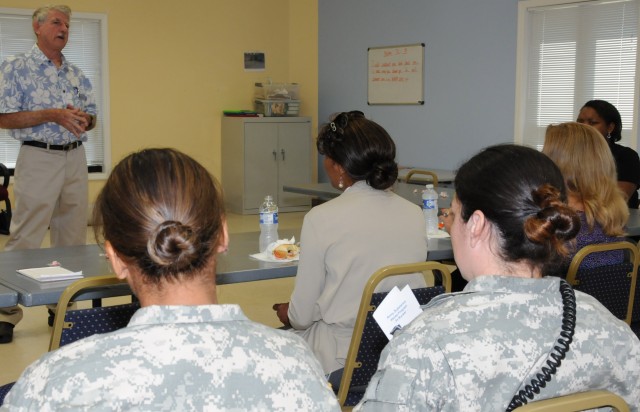
FORT RUCKER, Ala. -- Drinking responsibly can help reduce the number of crime victims and perpetrators, according to Army Substance Abuse Program officials.
ASAP hosted a lunch and learn session on "Alcohol: The Total Impact" Oct. 14 to teach participants about reducing alcohol-related crime during Crime Prevention Month.
Forty-percent of fatal vehicle accidents are alcohol related, Jesse Hunt, ASAP prevention coordinator, said. Statistics are similar in other situations including spouse abuse, suicides and drowning.
Abusing alcohol can be detrimental to Soldiers and civilians personally and professionally, whether or not these activities lead to addictions, said Jesse Hunt, ASAP prevention coordinator.
Being responsible about alcohol consumption can prevent situations from turning sour in the first place and lower crime rates, Hunt said.
During the event, he shared with participants the "zero, one, two" rule, describing how many drinks certain categories of people can consume and still be in control of themselves.
People who should not consume any alcohol include designated drivers, women who are pregnant or plan to become pregnant, people under age 21, people who are allergic to alcohol and recovering alcoholics.
"Moderate" or "low-risk" drinking is defined as one drink per occasion for females and two for males.
"That keeps you sober enough to use your senses, and keep your thinking good enough to operate safely," Hunt said. "Low-risk drinking is ideal (and) you eliminate a whole bunch of problems when you don't have alcohol."
Following these guidelines is especially critical for women in their child-bearing years, said Donald Schuman, ASAP clinical director. Babies can be affected by fetal alcohol syndrome or form alcohol-related birth defects if their mothers drink as early as the eighth or ninth day after conception - well before many women learn of their pregnancies.
People should be aware of alcohol-related problems in their friends and Family members and be proactive in seeking help. When drinking begins to affect a person's work life, the situation is way out of control, Schuman said.
"Confront it. Break through their denial that nobody sees it. Let them know you care," he said.
Some lunch and learn participants said they garnered beneficial knowledge from the session.
"I got good information about ASAP, and there were lots of things I didn't know about drinking while pregnant," said Spc. Rafaela Gambirazio, 6th Military Police Detachment Community Police member.
Her work allows her to interact with school children, and she believes alcohol education is important from an early age into adulthood.
"It's important to show the effects alcohol has on careers and relationships and how to make good choices," said Peggy Contreras, Community Police and Crime Prevention supervisor.
ASAP's goal is to help those addicted to drugs and alcohol to become productive citizens again and free them from their habits, Hunt said. Staff provides free counseling and services to active-duty servicemembers, their Families, National Guard and Reserve members, Department of the Army civilians and retirees.
ASAP is located in Lyster Army Health Clinic, Rm. T-100.
For more information or to schedule appointments, call 255-7509 or 255-7678.

Social Sharing